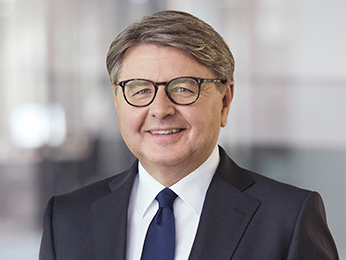Service Navigation
“We need real pensions again”
22 Nov 2019
“We need real pensions again” By Theodor Weimer
Demographic change and low interest rates pose fundamental challenges to wealth accumulation for old age. We must act: the capital markets must be given a firm place in old-age provision.
Theodor Weimer, CEO, Deutsche Börse AG
For decades, the situation was simple: pension funds, overnight money, life insurance – those who make long-term and regular savings get by well in old age. Thanks to interest and compound interest, this formula was not only profitable but also largely risk-free. But with interest rates falling, the tide has turned.
In addition, the German demographic structure is shifting further: baby boomers will end their working lives in the next few years. While the proportion of the population over 67 is still around 19 percent today, it will be 25 percent in less than 15 years. This puts the pay-as-you-go system for the statutory pension in an awkward position – and the federal government is having to pay more and more.
A new, viable concept is needed to ensure that retired people's incomes will continue to be sufficient without placing an excessive burden on those generations still working.
It is easy to see what is paralysing our old-age provision: we are not tapping the full potential. Our focus in Germany is on the statutory pension – but that is only one of three pillars supporting old-age provision. The opportunities offered by occupational and private pension provision remain virtually untapped.
While payments into the statutory pension are obligatory, the other two pillars are based on voluntariness – or rather on one's own initiative. Everyone is the architect of their own destiny. And the clear losers will be those who exclusively rely on the state pension fund.
No change is yet in sight. Instead, the state is insisting on guarantees for a large number of products for private old-age provision. But low interest rates mean that there is hardly any return, and little compound interest effect. The costs for the guarantees so loved by Germans are at the expense of long-term capital formation.
So where is the solution? On the capital markets! Only there can a higher long-term return can be achieved. Other countries are leading the way: in Sweden, for example, part of the statutory old-age provision is generated on the capital market. The Swedes have thus become a nation of shareholders – and they profit greatly from it.
The premium pension there is a savings method based on a purely defined contribution plan; there are no additional guarantees. 2.5 percent of gross income is saved monthly and employees can choose from various funds depending on their risk tolerance. Those who do not choose anything save in the standard fund AP7 Såfa, which invests primarily in equities. Sweden is just one of many countries that invest in equities for their old-age provision.
Now some will cry out: shares? Too risky! Diversifying widely and investing for the long-term is the answer. The statistics show that those who follow this rule will be rewarded with a higher return if they take more risk.
The Swedish AP7 Såfa has generated annual high single-digit returns since 2000. Investments in the DAX have yielded an annual return of 7 percent since 1968. And if that doesn't convince you, the world's most important stock markets have achieved an average annual return of 5 percent since 1900 – despite economic crises, world wars and inflation. Overnight money savers and pension depositors can only dream of this.
Employee shares are an effective means of attracting at least some employees to the capital markets. Employee share ownership promotes long-term asset accumulation with shares, while strengthening identification with the employer. It also removes barriers, such as the fear of failing in the capital markets due to a lack of knowledge. The state can make a decisive contribution here by promoting this form of company pension provision more strongly – through higher allowances for employees or simplified processes for companies.
The parties of the grand coalition have recognised that old-age provision must be strengthened; they have written this into the coalition agreement. Whatever this strengthening may look like, three lessons must be taken into account. First, guaranteed returns can undermine optimal investment strategies. Second, old-age provision must also take place on the capital markets. And third, we need products that are accessible to all and do not have high administrative costs.
The tax authorities would also benefit considerably from a capital-based old-age provision, as anyone who fails to make private provision for old age will have to pay for it later – and ultimately the taxpayer will suffer. In recent years, the federal government has shown itself to be particularly generous in the expansion of social benefits, most recently in basic pensions. However, the question of the long-term financing of our pension system remains unanswered.
Our pension system needs real reform. Because we need real pensions again. Pension that are enough to live on.
By Theodor Weimer
The article was first published in Frankfurter Allgemeine Zeitung on 22 November 2019.


